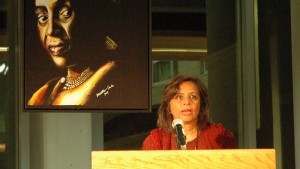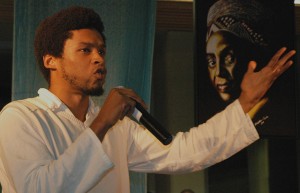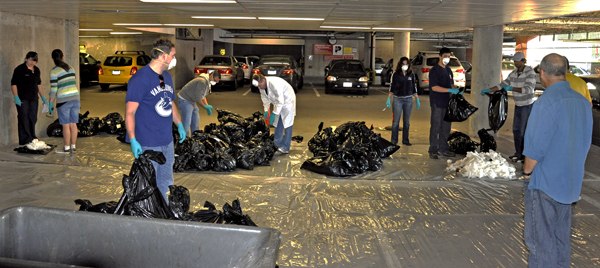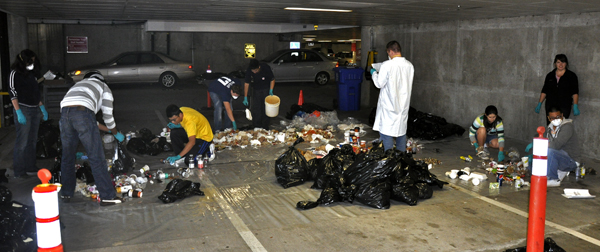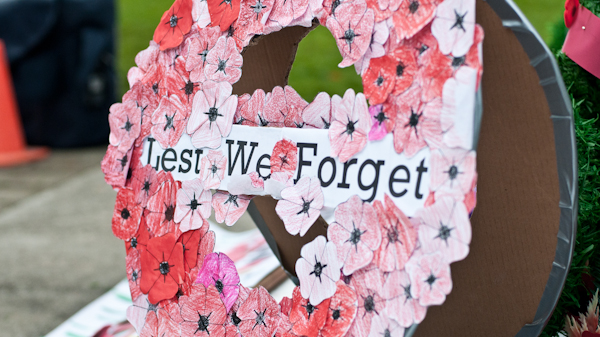Kwantlen ambassadors collect coats and more for homeless
December 11, 2010 by Jeffrey Yip · Leave a Comment
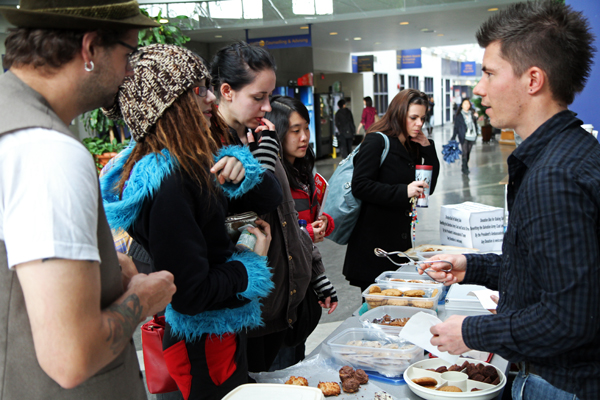
Stephan Struve, a member of the President's Ambassadorial Team (PAT), serves up baked goods to hungry students on their way to and from class last week. Many of the baked good were made by PAT members. The bake sale was held in the rotunda at Kwantlen's Richmond campus. (Photo by Jeffrey Yip)
It might not be snowing right now, but the President’s Ambassadorial Team (PAT) hopes students will continue donating their old coats to help the homeless.
The PAT coat drive is collecting “gently-used” men’s and women’s coats, blankets, gloves, hats and new socks, with the donations going to “homeless shelters in the communities that Kwantlen serves.”
Clothing donation boxes, decorated with Christmas wrapping paper, can be found in any of the Kwantlen libraries.
“The [coat] drive was an initiative of one of the PAT members, Patricia Coburn. She and I talked about doing a Kwantlen gives back type thing,” said Shelley Coburn, a recent Kwantlen graduate, who now works for external relations for the president’s office.
PAT is a group of 16 outstanding students who work directly with the president and represent Kwantlen at different functions in the community.
As part of the coat drive, PAT held a bake sale at the Richmond campus on Dec. 8 and will hold another at the Surrey Campus on Dec. 9 from 10:30 a.m. to 2:30 p.m.
“With the money that we’re raising through the bake sale and other donations, we’re going and buying [more] new socks, new hats and new mittens,” Coburn said. “Social justice is something that is important to one of the PAT members and the whole team has pulled together and supported this initiative. It’s nice to give back to the community.”
Coburn believes the harsh winter weather in November made many students aware of the need to give. “People made the connection: ‘It’s very cold and I’m lucky, so I’ll donate,’” Coburn said. “We’ve seen a huge increase in the amount of clothing coming in towards the end of the coat drive.”
According to Coburn, PAT has collected about 16 “gigantic” garbage bags full of clothing so far. Officially, the coat drive ended on Friday, Dec. 10, but Coburn says the boxes will be in the libraries until early next week.
New drinking-driving laws: Students speak
December 5, 2010 by Stu Gallacher · Leave a Comment
New drinking and driving laws in B.C. have received a lot of media attention. Some say that random roadblocks are an infringement of our civil rights; others report that bars and restaurants have suffered a sharp decline in sales.
To find out what younger people are saying of the recent crackdown, Kwantlen students were asked what they think of the new drinking-driving laws and how their social drinking habits have changed because of them.
Anna Peregoudova, anthropology
“It’s obviously safer, but I work in the restaurant industry and I’ve noticed a lack of business. I haven’t been drinking much since school started, so I don’t think it’s affected me too badly.”
Nate Ferguson, psychology
“The new laws are good, because they’re trying to stop people from drinking and driving. I’m still tempted to go to the bar, have a couple of drinks and drive home. But ultimately, I’m not going to. It’s not worth it.”
Ashley Seller, general studies
“I think the punishments are too harsh. I don’t drink and drive, but I depend on friends for rides and I know they’re going out less. When we do go out, we get a cab home. It can be hard from down town though.”
Thomas Harskamp, sciences
“I don’t think they have particularly affected my social drinking habits. The lower limits have affected a lot of friends though. They’re not even willing to come out, have a couple drinks and drive home a few hours later, even after giving the alcohol a chance to metabolize.”
Brittney Taylor, psychology
“I think they’re ridiculous. For example, last weekend I had to wait an hour for a cab…transit is the biggest problem. I think they need to keep the trains running later.” Harskamp says the city needs to improve the transit system, from buses, to trains and taxis. “It also compounds a lot of the issues in the city with public transit. It’s not manageable to get home after a really late night.”
Nursing students helping immigrant women
December 5, 2010 by Matt Law · Leave a Comment

(From left to right) Fourth-year nursing students Gillian Fantillo, Brianne Southcott, Krista Rohachuk-Smith and Kathryn Hull have worked to launch a new immigrant woman's clinic in Surrey as part of a school project. (Photo by Matt Law)
Nursing students in their fourth year at Kwantlen Polytechnic University are helping to lay the groundwork for a new women’s clinic in Surrey.
The goal of the clinic is to help educate immigrant women on sexual health and their rights in Canada.
“Basically, we are a link between the woman and primary health care,” said Krista Rohachuk-Smith, a nursing student at Kwantlen. “We do birth control counselling, [and providing information on] contraceptives, housing, abortion, domestic abuse is also something we do.”
The clinic started as a joint effort between the Progressive Intercultural Community Services (PICS) and Kwantlen instructor Dr. Balbir Gurm.
Students began working on the clinic in January 2010, paving the way for the current group of four students to continue their work and launch the program.
Funding has been tight for the start-up organization and they have received much of their material by donation. Office space and resources were provided by PICS and the Kwantlen Student Association has provided tampons and condoms free of charge.
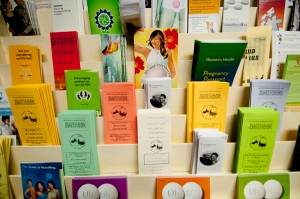
The clinic offers information and education on womans sexual health, rights and abuse. (Photo by Matt Law)
“We’re hoping that once our grand opening happens and some of the local politicians come out and see, they might want to start offering funding for us,” said Rohachuk-Smith.
The clinic offers both anonymous consultation over the phone and email and in-person appointments and drop-in visits. And the clinic is free and confidential.
In many cultures, there are stigmas around women’s sexual health issues that make it hard for immigrants to seek help and advice. Abuse and lack of knowledge leave many women helpless.
“You hear a lot of stories about women who don’t know that rape exists within a marriage. You have a right to say no, you have a right to go on birth control, you have the right of the woman to decide how many children you want in Canada,” said Rohachuk-Smith.
In some cultures, women are not allowed to use birth control and often are refused access to it by family and physicians.
“The thing that we were most shocked about is hearing stories about women going to a doctor or going to a pharmacist to get treatment or birth control and having that pharmacist or doctor call their husband. That was the most shocking because according to their scope of practice it is supposed to be confidential and they don’t have the right to do that, but it happens,” said Gillian Fantillo, also a nursing student at Kwantlen.
The clinic has a number of resources to help women in these situations, including lists of pharmacies that are not safe to use, connections with the RCMP and legal groups.
The clinic held its grant opening at its office in Surrey last week. Office hours are Thursdays, 9 a.m.-3 p.m.
For more information on the clinic, email womens.clinic@live.ca, or call 604-596-7525, ext. 243.
Infographic: Comparing the cost of an education
November 23, 2010 by Jeffrey Yip · Leave a Comment
Jeffrey Yip and Hayley Woodin have compiled information on the cost of getting a university education in B.C. and present it in the form of an interactive graphic (Flash is required). You can see a detailed breakdown of the separate costs that add up to the total, and compare the cost of a university education at Kwantlen with other post-secondary institutes in the province.
Hello Africa: introducing field schools in Kenya and Ghana
November 22, 2010 by Paul Fleischanderl · Leave a Comment
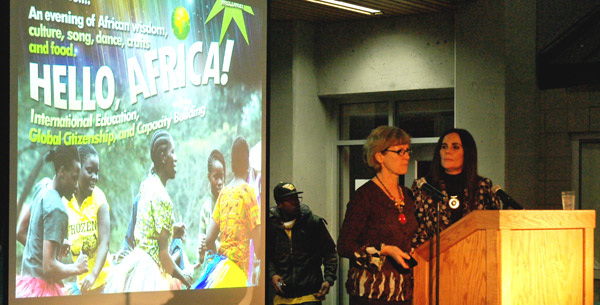
Jessie Horner (left) and Joan Nesbitt, both instructors in Kwantlen's criminology department introduced plans for field schools. (Photo by Paul Fleischanderl)
Hello, Africa, held at the Surrey campus Nov. 15, was about African music and food — and announcement of plans that could see Kwantlen students studying at field schools in Ghana and Kenya.
Criminology instructors Joan Nesbitt and Jessie Horner introduced plans for the field schools. “The field schools are an attempt to learn from one another in approach to become world citizens,” Nesbitt said.
Nesbitt and Horner went to Kenya last summer with Dr. Charles Quist-Adade as planning for a field school in Africa got under way. The current plans include an eight- to 10-week course for Kwantlen students in May 2012, worth between six and nine credits. The first two weeks would consist of preparation for Africa at Kwantlen. While in Africa, students would attend prospective partner schools Moi University in Eldoret, Kenyatta University near Nairobi or the University of Nairobi, all located in Kenya. The costs for participating in the field school in spring 2012 will be around $5,000 per student.
The reason for choosing Kenya as a destination is that there is already a relationship with Masinde Muliro University of Science and Technology there. Also, the field school might be a case study in development and it is supported through the Canadian International Development Agency (CIDA).
Horner and Nesbitt were concerned with the lack of Kenya or even African content that Kenyan criminology students study from. Horner and Nesbitt fear that without such a Kenya-based program, the schools run the risk of “re-colonizing” students with Western ideas and systems of thought.
The event’s keynote speaker was Prof. Kogila Moodley, professor of sociology at UBC who focusses on multiculturalism and race relations. In her speech, she compared Ghandi and Mandela and posed the idea that non-violent resistance may have been uniquely successful in Gandhi’s case.
The event also featured the African percussion band Zion Dancers, poet Scruffmouth, music, singing as well as African food such as peanut curry soup, green curry stew with potatoes and spicy pitas with a red rooibos tea latte.
Kwantlen students who wish to participate in a field school, can attend one in July 2011. The Ghana field school experience is transferable for six credits at Kwantlen, and lasts for three weeks. For details and registration see Dr. Charles Quist-Adade, instructor in the sociology department.
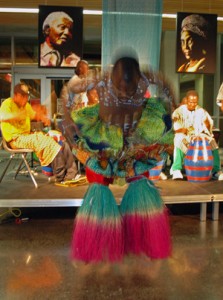
Zion Dancers played traditional African music at the event, prompting the crowd to get up and join in the dancing. Photo by Jeff Groat
BBA entrepreneurship students making a difference on DTES
November 22, 2010 by Brittany Tiplady · 1 Comment
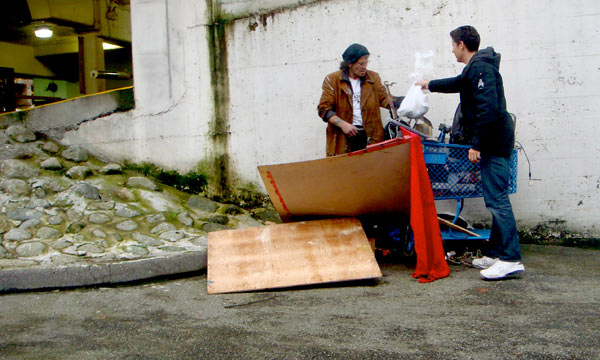
Charles Konopski distributing packages on Saturday, Nov. 13 in Vancouver's downtown eastside. (Photo courtesy of Students for Homeless.)
Four weeks ago, a group of fourth-year BBA entrepreneurship students — Harsh Thakkar, Charles Konopski, Kelly Saunders, and Amar Phull — started Students for Homeless, which has since raised close to $48,000 to help homeless people on the Lower Mainland.
The fundraiser was a project for an entrepreneurship practicum class, with a mandate to help the Vancouver downtown eastside homeless by making care packages to help stay warm and safe in winter.
“What we do, is we collect pledges of $15 and $25 and use those pledges to purchase supplies for care packages. The packages have socks, thermal blankets, a toque, gloves, first-aid supplies, a couple garbage bags, and a map of the homeless care facilities in Vancouver,” said Konopski, co-founder of Students for Homeless.
Pledges were collected over four weeks, and all of the supplies were purchased through a wholeseller. Members of the group also stood outside of Choices Market in White Rock to get the public involved through pledges.
“We tried to sell as many in person, and a lot of time people didn’t have a lot of cash on them, so we would direct them to our website, and sent them an email and a lot of people went home and donated through our website, which we were very happy about,” said Konopski.
The fundraiser had a target of raising enough funds for 200 packages. But with the help of personal and social networking, and an overwhelming positive response from peers and the general public, as well as a sponsorship from Coast Capital Savings, Students for Homeless had enough for 200 packages by the beginning of the third week, and ended their project with 244 packages to distribute to the homeless.
“We definitely got some really good reception from both our peers and the general public. A lot of people thought it was a really great idea. I guess a lot of issues with non-profits is that you donate your money and you don’t really know where it goes, whereas with this fundraiser, when you donate you are pledging a package for an individual,” said Konopski.
“This way people are able to help the homeless and make sure they get something to eat, and socks and things to stay warm. We had a lot of support.”
On Saturday, Nov. 13 the group distributed 200 packages on Vancouver’s downtown eastside. While the response from the public had been positive, the response from the homeless was the inspiration for the project.
“The best part is the way they responded when we gave them the packages,” said Harsh Thakkar. “They were just giving us blessings and were so happy. We were giving them to people who we saw didn’t have toques or dry socks, and they were getting soaked in the rain, and they were just really excited to receive the packages.”
With 44 packages left, which will be distributed in Surrey, the project has been deemed a monumental success.
“What learned is that as much as it is about making money, it is also about giving back to the community. And that’s what we learned the most. All we wanted back was the blessings and the happiness we saw in people’s faces, and that’s something we were really touched by,” said Thakkar.
For more information, check out www.Studentsforhomeless.org.
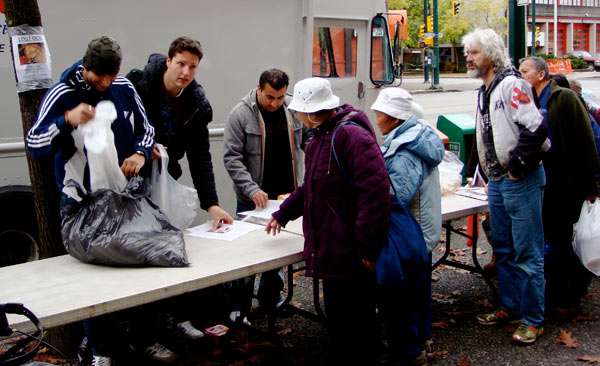
Vancouver Homeless gather at Food on the Corner to receive their care packages. (Photo courtesy of Students for Homeless.)
Best Buddies comes to Kwantlen
November 22, 2010 by Hayley Woodin · Leave a Comment
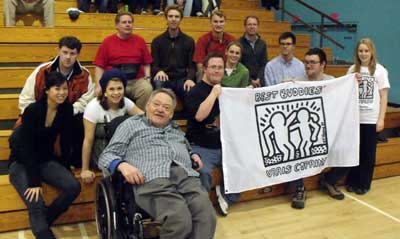
Students from the University of Victoria participate in their school's Best Buddies chapter. (Photo provided by Best Buddies)
A nation-wide charitable organization called Best Buddies fosters strong friendships between high school and university students, and individuals with intellectual disabilities has come to Kwantlen’s Richmond and Surrey campuses.
Students are matched up by chapter presidents to community residents who share interests, personalities and schedules. And the rest is pretty much left up to participants.
“It’s up to the students to make and develop their friendship as they want,” said Amy Lynn Taylor, the Western Canada program manager and current chapter president for the Surrey campus.
“We hope they are meeting as frequently as they’d like to,” she said, adding that students and their buddies are encouraged meet a minimum of twice a month.
Depending on the pair, time between students and their buddies is spent doing what the average young adult does: shopping, dining, movie-going and chatting.
Ora Chen, Richmond chapter president, spends most of her time with her buddy Winnie shopping at Richmond Centre.
“Our relationship is very good; she thinks I’m really a good friend, and she’s really good in our friendship,” Chen said.
While the chapter presidents generally host four group meetings each school year, the program is mainly meant to provide a safe and encouraging way for students to get involved in the communities around Kwantlen, and meet and interact with people outside of school who don’t necessarily have the same opportunities as they do.
Both chapters work closely with Community Living British Columbia, an organization that works with adults who have intellectual and developmental disabilities.
As Taylor explained, the community clients from CLBC genuinely appreciate being able to meet students, go out, have fun and spend time with people who enjoy spending time with them as well.
The Surrey and Richmond chapters are relatively new, and as there are currently more buddies than volunteers, both chapters are always seeking student participation.
Students can participate in either the Surrey or Richmond chapter for as long as they attend Kwantlen, or have the time to commit to the program. But even when schooling comes to an end, the friendships made between students and their buddies often don’t.
“In a lot of cases, they do continue to stay in touch,” Taylor said.
For more information on the program, visit www.bestbuddies.ca, or seek out the Best Buddies booth at the Kwantlen volunteer expo being held at the Surrey campus Nov. 23 from noon-5 p.m., and at the same time on Nov. 24 at the Richmond campus.
High hopes for this year’s garbage audit
November 16, 2010 by Stu Gallacher · Leave a Comment
Environmental students have been sifting through piles of garbage from the Richmond campus to gather vital information about the school’s disposal system.
On Oct. 19, environmental protection technology students began conducting aa two-day garbage audit in order to determine whether it would be beneficial to start a composting program.
“We’re trying to get an idea of how much garbage Kwantlen is producing and where it’s coming from. Once we can quantify all of it, we’ll try to make some suggestions of what to do with it: whether it would be worth it to have our own composting facility or just participate in Richmond’s composting program,” says Mike Ferko, who’s in charge of the audit.
“We collected garbage from various sites, such as the hallways, the washrooms, the cafeteria and outside. We weighed it, compared it and we’re analyzing the results so we can write a report about it,” says Neil Brooks, a second-year student and first-time participant of the audit.
“UBC has a huge composting facility, and we’re trying to draw some comparisons between us and them to see if it’s feasible. They have a huge horticulture program, so they produce a lot more waste than we do,” says Ferko.
“In the cafeteria and kitchens, there were a lot of things that we found that could be composted or recycled,” says Brooks.
Ferko agrees that most of the garbage is cafeteria waste and is able to be composted. “There’s just too much recycling thrown in the garbage.”
Ferko says that saving money on garbage removal would be a major benefit of a successful composting program.
“It cost money to send waste to the landfill. Composting is basically taking nutrients from your food, your banana peels and such, and breaking them down into soil so plants can use them again. But you’re not supposed to compost meat because you’ll attract pests and rats and raccoons,” says Ferko.
“The experience itself was pretty gross. I was digging through trash from the cafeteria that must have been three days old, just sitting in a room in garbage bags. So the actual experience, I’m not going to rush back to do it again,” says John Currie, a second-year student also participating for the first time in the audit.
Currie says that it’s important for industries to make and use products that can be recycled, instead of wrapping everything in a bunch of non-recyclable plastic. “We want the producers to think about how they can help…to help change the system from the ground up.”
Kwantlen event: Hello, Africa!
November 15, 2010 by Jeff Groat · Leave a Comment
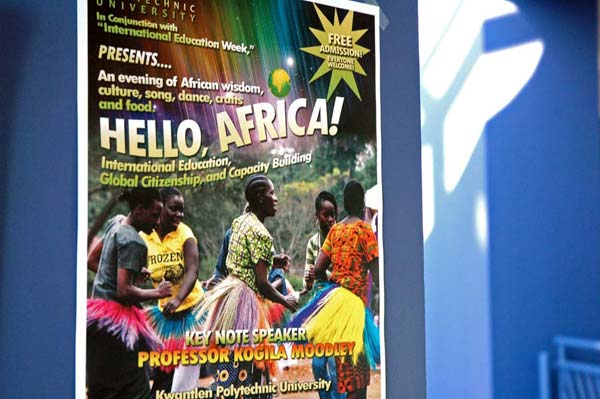
Hello, Africa! is being held at Kwantlen’s Surrey Campus on Monday, Nov. 15. The event will be “an evening of African words, wisdom, song, dance, drumming, crafts, food and drink.” Photo by Jeff Groat
Hello, Kwantlen, Africa’s calling.
Hello, Africa! kicks off International Education Week at Kwantlen on Monday and features a keynote address from UBC sociology Professor Kogila Moodley.
“This event came about as a result of myself and two colleagues going to Kenya this summer,” said Joan Nesbitt, who is part of Kwantlen’s criminology faculty and is an organizer of the gala.
“The three of us went to Kenya to look at the feasibility of setting up international field schools there,” she said. Part of the grant that paid for the trip to Kenya included a community dialogue session back at home, leading to Hello, Africa!
Moodley’s address is titled “Gandhi & Mandela: Reconciliation in Divided Societies” and is expected to touch on themes of building dialogue between local communities in the developed Western world and the continent of Africa, or the global south at large.
Nesbitt and her colleagues are in the very early stages of setting up international field schools in Kenya and Tanzania, where Kwantlen criminology or sociology students may be able to go on exchange.
Monday’s event is meant to highlight the importance of exchanges and of sharing educational resources between communities. It is sponsored by Kwantlen’s criminology department.
Moodley, according to the Hello, Africa! program, is professor of sociology at the University of British Columbia, where she was the first holder of the David Lam Chair in Multicultural Studies.
Kwantlen Students reflect on Remembrance Day
November 12, 2010 by Max Hirtz · Leave a Comment
Do you think that Remembrance Day is losing its significance?
Mystica Lopez De Leon: “Maybe because more veterans are going, and then they’re not really here to remind us of what’s actually happening. But then, I guess we should look to the new generation that’s fighting elsewhere.”
Ryan Calasin: “I do think it has, because most of my friends, they just studied, they just did their homework, just partied last night.
Peter Coombs: “It’s very significant. From what I saw in the media, there was a lot of young people showing up. I don’t think it’s lost its effectiveness.”
Colin Pearson:”It was a personal day for me. My parents are at an age where they did participate in WWII… other than that, it was just a holiday-type day.”
Jack Yao: “I don’t know anybody who celebrated it, but I see a lot of people wearing the [poppy].”


